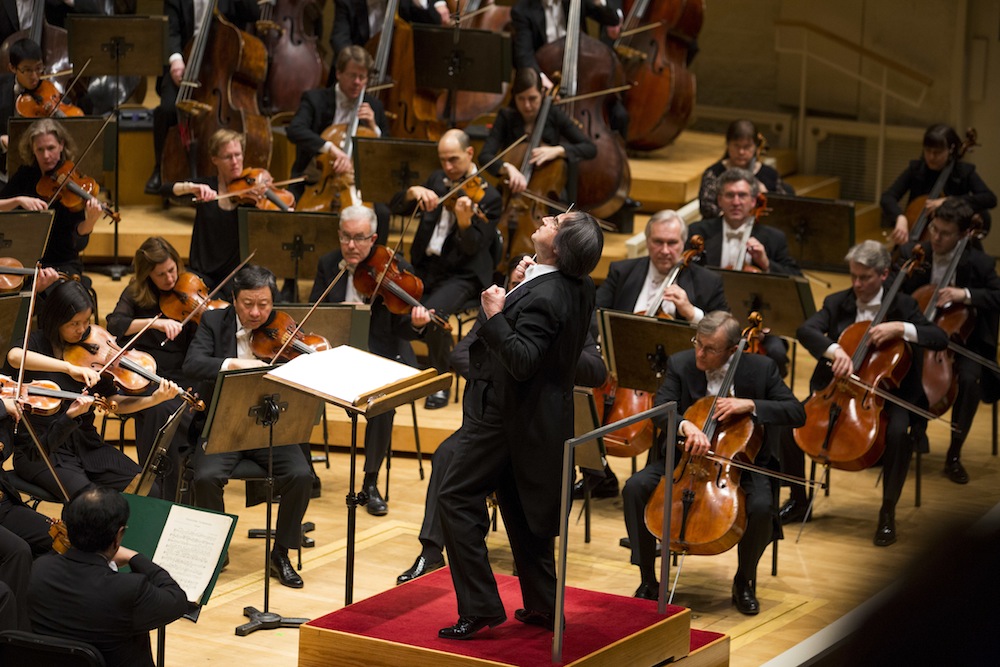Muti and CSO deliver gripping and intense Tchaikovsky

After his beloved compatriot Giuseppe Verdi, no composer seems closer to Riccardo Muti’s heart than Peter Ilyich Tchaikovsky. The combination of stormy drama and yearning lyricism perfectly fits Muti’s musical personality and Tchaikovsky’s music has provided the CSO’s music director with some of his most rewarding nights.
And so it proved again Thursday at Orchestra Hall where Muti’s season-long Tchaikovsky cycle with the Chicago Symphony Orchestra arrived at the composer’s final work, the Symphony No. 6 in B minor.
With the intervening century and a quarter producing even more angst-ridden music by Mahler and others, it’s no mean feat to make Tchaikovsky’s familiar “Pathetique” sound with the audacity and originality that bewildered the audience at its 1893 premiere.
Yet Muti and the CSO put across the emotional drama and black depths of this music with unsparing precision and dramatic acuity. Muti’s textual fidelity consistently made for vital and illuminating results, often bringing out details sloughed over by lesser hands en route to the next big orchestral outburst.
A dark, spacious opening bassoon solo by William Buchman set the tone for an uncommonly fresh performance with great breadth and yet crackling intensity. The introspective main theme of the first movement had just the right level of pensive sobriety without being overplayed. The sudden orchestral outburst that launches the development was explosive and aptly jarring, and the main climax craggy and imposing yet kept in scale.
Airy and elegant, the second movement’s waltz rhythms provided a welcome respite, transitions seamlessly turned. The ensuing march was more firmly rooted than most yet went with a jaunty elan, building to an energetic yet firmly held coda. (Muti’s control extended to the audience, with a quick extended palm behind his back immediately squelching the premature applause.)
If Thursday’s flowing performance of the Adagio lamentoso didn’t quite plumb the full tragic depths of the finale, it came close and was quite gloriously played. The transparency and clarity elicited by the CSO music director made one wonder anew at the ingenuity of Tcahikovsky’s scoring in this desperate cry from the heart, as with the bitter, acidy tinge of the muted horns. The final long descent of the basses and cellos into bleak, resigned silence was handled with unerring control by Muti, the final pppp note hovering on the threshold of audibility. Miraculously, no cough spoiled the moment and Muti held the silence for a full minute before lowering his arm to enthusiastic applause.
Another large-scale work made up the first half, Scriabin’s Symphony No. 2—last played by the CSO in 1969—the current installment in this season’s other ongoing Russian cycle.
Like Scriabin’s First Symphony, which was heard last month, the Second is written on the grand scale, spanning five movements and fifty minutes. The Second is somewhat less excessive than its predecessor—no overblown choral finale extolling the glories of art here. The music is cast in the same hazy, languorous style, a kind of Rimsky meets Szymanowski crossed with Debussy, with more false endings in the final movement than Sinfonia domestica.
There are many beautiful moments in Scriabin’s surging, iridescent score. Still, the high-sucrose melodies and swooning climaxes ultimately leave one feeling musically stuffed and vaguely guilty, and hearing this work once every 46 years feels about right.
As shown by his still-unmatched Scriabin set recorded with the Philadelphia Orchestra, Muti has a sure sense of the ebb and flow of this score–tempering the bombast, bringing dynamic nuance and immaculate balancing, and allowing the beauties of the score to emerge while keeping the music on track.
The playing was even more richly spun and luxuriantly upholstered than in last month’s Scriabin, with glowing corporate string tone. There were especially inspired contributions by Robert Chen’s sweet-toned violin solos and the bucolic flute playing of guest Thomas Robertello in the long central Andante. Clarinetist Stephen Williamson, who is proving the sturdy, mature anchor of the CSO’s unsettled woodwinds, provided glorious playing throughout.
The program will be repeated 1:30 p.m. Friday, 8 p.m. Saturday and 7:30 p.m. Tuesday. cso.org; 313-294-3000.
Posted in Performances

Posted Feb 27, 2015 at 6:25 pm by Frank Monnelly
Kudos to Maestro Muti for bringing less familiar pieces such as the Scriabin played last night. The Pathetique was suberb. Maestro Muti led an open rehearsal this past Monday of a youth orchestra of the first and fourth movement of the Pathetique and was able to lead them through a fine performance. He allowed them to play the big tune from the first movement on there own.The players rose to the challenge with a reading that did not seem to these ears overly sentimental.
Posted Feb 27, 2015 at 11:16 pm by Peter Borich
Wonderful wonderful Tchaikovsky 6th, despite the rude coughing and hacking throughout the entire program. A visibly cranky maestro, and justifiably so ….
Posted Feb 28, 2015 at 5:07 pm by T.C. McKeon
Heard the donor rehearsal on Thursday morning. It suggested that the performance that evening would be as reviewed here, wonderful. Maestro Muti, though, is a much more relaxed and congenial leader before the donor group. He actually encouraged some between movement applause while working with the orchestra as part of his repartee with the donor group, which is a seasoned, tuned, generally well behaved audience (also pretty old). The donor rehearsals are great fun, making donations very worthwhile. He’s a good salesman.
Posted Mar 04, 2015 at 1:01 am by Peter-D-G
We went to the Tuesday (3/3) performance. The Scriabin didn’t meet my expectations. We heard his first and third symphony earlier, which I found much more exciting then expected. Yet the second didn’t impress me the same way.
But Muti’s performance of the very familiar Pathetique was beyond anything I expected. I’ve never heard that music played with such emotion – especially the last movement. I was keyed up for the applause after the third movement – after all the comments here and elsewhere. It didn’t happen! Muti just held his arms out in a gentle A position and the hall remained absolutely still. Not even the usual between movements coughing and rustling. I think Muti was energized by this. There is a long stretch where the second violins aren’t playing. I could see the emotion in their eyes as they sat there clutching their instruments with their chins propped up on the scrolls.